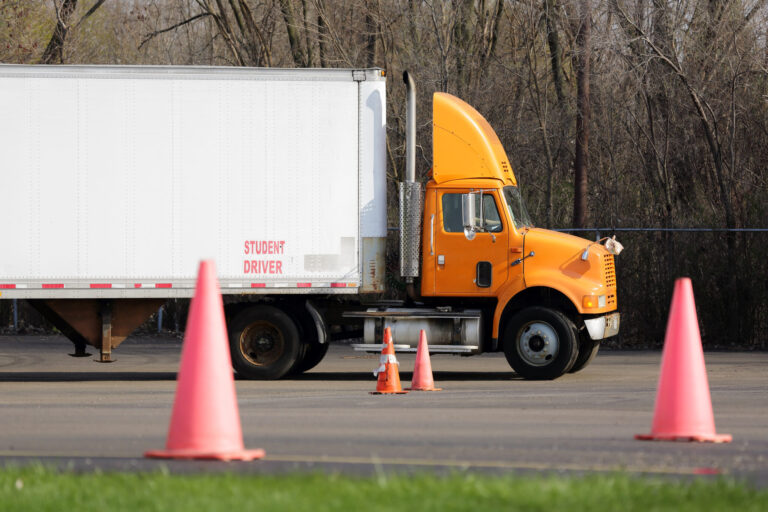In response to the national emergency resulting from the global COVID-19 pandemic, on March 28 the Federal Motor Carrier Safety Administration (FMCSA) issued a three-month waiver that relaxes some regulations for commercial learner’s permit (CLP) holders.
The two-pronged waiver is designed to facilitate the flow of essential products and personnel during the national crisis declared by President Trump and will continue until June 30 or until the president revokes the declaration of national emergency related to COVID-19, whichever comes first.
The waiver states that because of the closing of many state driver licensing agencies (SDLA) in accordance to guidelines from the Centers for Disease Control and Prevention (CDC), “some SDLAs may be unable to process and issue a commercial driver’s license (CDL) credential to eligible CLP holders who have passed the driving-skills test.”
Because of the national emergency and the need for timely transport of essential supplies, equipment and personnel, the waiver provides relief from two regulations:
- First, the requirement that a CDL holder with the proper CDL class and endorsements be seated in the front seat while a CLP holder operates a commercial vehicle on public roads or highways is lifted; however, the CDL holder must be present in the vehicle, the waiver states.
- Second, states may now administer driving-skills testing to any nonresident CDL applicant regardless of where the applicant received training. Normal restrictions limit nonresident testing to applicants who received training in that state.
Click here to view the entire waiver.
“FMCSA finds that the granting of this waiver is in the public interest, given CDL and CLP holders’ critical role in delivering necessary property and passengers, including, but not limited to, shipments of essential supplies and persons to respond to the COVID-19 outbreaks,” the waiver states. “This waiver is in the public interest because it would allow drivers covered under this waiver to deliver essential supplies and persons across state lines to address the national emergency. This waiver will also reduce the administrative burden on CLP holders during this national emergency.”
FMCSA says the waiver should not impact highway safety, citing the “limited scope of this waiver and the ample precautions that remain in place.” The agency emphasizes that “this waiver does not alter any of the knowledge and skills testing requirements for a CDL, a CLP or a necessary endorsement.”
Veteran OTR drivers and trainers expressed concern to The Trucker about the first prong of the waiver — allowing CLP holders to operate a commercial vehicle without a CDL holder in the passenger seat — but agree that ultimately the decision should be made on a case-by-case basis depending on the skill level of the trainee.
“There’s a lot involved with driving a truck, like keeping your safe distance, making sure that the driver can make turns — that they get in the habit of swinging the truck wide — lane control and more. If at any time as a mentor, if I feel like the student is not ready to be up in the seat by himself, I will continue to stay up there,” said Orlando Roberts, a driver-trainer for Phoenix-based Swift Transportation.
“I personally believe that giving the permit holders the ability to drive unsupervised is not necessarily a good thing,” said Jonathan Markum, a Tennessee-based OTR driver with more than 20 years of experience and two million safe miles with his current carrier. “I believe it actually could endanger lives, depending upon the individual’s skill level, and I have to specify, also depending upon the level of training they’re receiving from their trainer.”
Markum added that he believes the purpose of the waiver is to help drivers move freight faster by allowing students and trainers to operate like a team, allowing each other to rest while staying on the road.
“It takes quite a bit of practice to sleep when the truck’s going down the road, hitting all the potholes and sways of the road, the wind, the noise, all the rest,” he said. “I don’t think [the students] will get proper sleep because it takes time to break into that rhythm; you can’t just start out and drive like a team operation overnight.”
Roberts and Markum agree that allowing states to issue CDLs to nonresident CLP holders, regardless of where they obtained their training, could be a good way to expedite licensing and keep drivers on the road.
“Because we do have an emergency situation right now with the coronavirus, it is going to help the industry move freight a lot faster, because of the simple fact that these people don’t have to go back to another state to get their license,” Roberts said.
Markum said he believes that, regardless of what state issues a CDL license, the most important thing is to make sure that drivers are adequately trained before receiving their license.
“First off, it’s the call of the company: Have they trained the trainer correctly? Second, it’s the call of the trainer,” Markum said. “And third, these new drivers should be truthful enough to say, ‘I’m ready’ or ‘I’m not ready.’”
Linda Garner-Bunch has been in publishing for more than 30 years. You name it, Linda has written about it. She has served as an editor for a group of national do-it-yourself publications and has coordinated the real estate section of Arkansas’ only statewide newspaper, in addition to working on a variety of niche publications ranging from bridal magazines to high-school sports previews and everything in between. She is also an experienced photographer and copy editor who enjoys telling the stories of the “Knights of the Highway,” as she calls our nation’s truck drivers.








